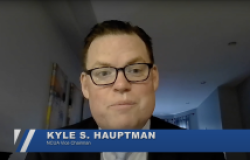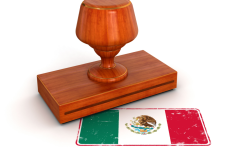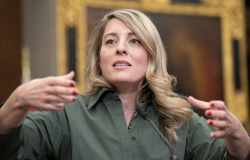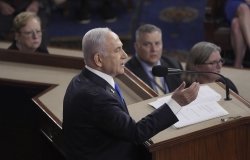Remarks by Rep. Barbara Lee Accepting William Monroe Trotter Award
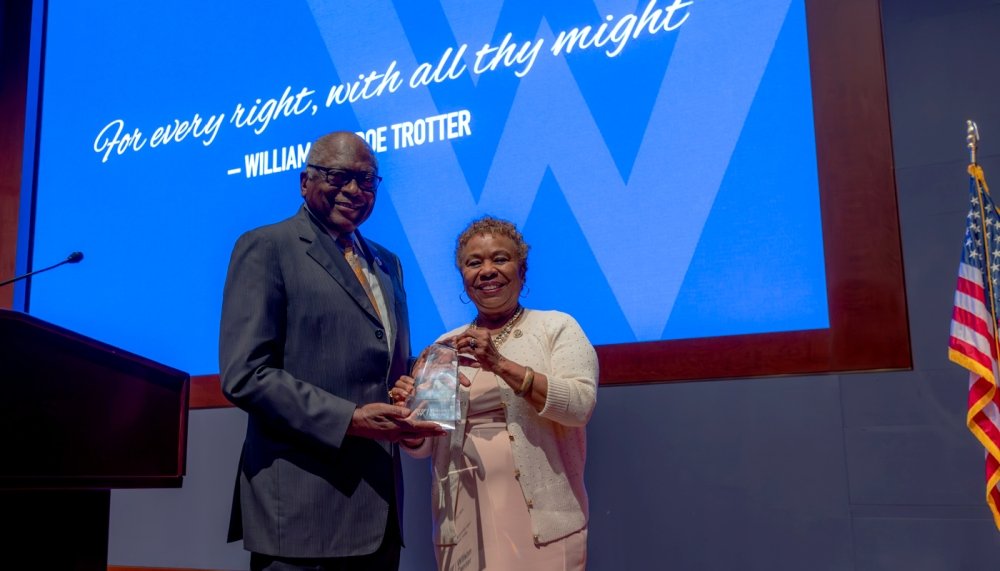
Wilson Center
Remarks by Rep. Barbara Lee
Accepting William Monroe Trotter Award
Woodrow Wilson International Center for Scholars
July 24, 2024
Thank you so much for this award. I particularly want to thank Congressman Jim Clyburn and Mayor Karen Bass for their powerful examples of public service, as well as their constant friendship and support.
I also want to thank Ambassador Mark Green of the Wilson Center, who has been such a champion for a US foreign policy that lives up to its ideals: one based on building true partnerships and advancing the principles of justice and equality.
I am really honored to be the recipient of an award named after William Monroe Trotter. Monroe Trotter was many things. A scholar. A journalist. An activist.
But above all else, Monroe Trotter was known as a fighter. A descendent of those enslaved at Monticello, he spent his life fighting the systems of power that kept Black people oppressed, and he never, never backed down from advocating for the principle of basic equality and human dignity, here at home or around the world.
That principle is—ostensibly—the basis of America’s founding principles—the idea that every individual human being is born with inherent rights and dignity. That the systems that bind our nation together ought to treat each person they touch with equal fairness, kindness and respect. Of course, even as that ideal continues to guide us, America has too often fallen short of achieving it. But that has not deterred a single person here in this room. And when I look around, I see leaders and scholars, activists and fighters, who are motivated to make dignity and equality a reality not only for people in America, but for people all over the world.
A foreign policy based on this principle does not need to mean, and in fact must not mean, we impose our American vision of equality on others. It means putting in the work to build true partnerships on the ground across the world. It means listening. It means not only asking others to prioritize the threats that motivate us in Washington, but also taking seriously the threats they see as most dangerous where they call home. And it means leading by example.
Our arguments for human rights and human dignity are going to fall flat, and building true partnerships will not be possible, if we don’t address how we ourselves are failing to live up to these values. I am talking about the ongoing inequality and structural racism that we need to confront. It’s a problem for all of America. And our foreign policy establishment is no exception.
Here are the facts.
In our country, people of color have persistently lower employment, lower incomes, and poorer health outcomes.
Over the last four decades, African American unemployment has been almost consistently double white unemployment.
Black and Hispanic workers make only two thirds of what white workers make.
And Black mothers are far more likely to die from pregnancy-related causes than are white mothers.
And the reality is that these disparities are echoed in our foreign policy establishment. A 2020 GAO report found that people of color at the State Department and USAID had actually lost ground in many areas since the year 2000. In particular, the number of African Americans in the senior ranks of the foreign service fell by more than half—from 7% to 3%. Let that sink in: the number of Black senior foreign service officials fell by more than half, in the 21st century.
The facts about inequality, including in our foreign policy establishment, are ugly, and they are persistent. We can’t ignore this reality and hope that it will magically improve. Instead, as I think we can all resoundingly reject racist tropes and agree that no people is inherently inferior, we are left with only three conclusions.
First, that there are real, structural barriers in place that hold Black Americans back from true human dignity and the full promise of a just and equitable society. Second, that those barriers are not based in fact, but are biased and baseless tools of oppression that must be dismantled. And finally, that overcoming those barriers requires active measures that will push us toward justice.
We need to do this work. The young people who go into government service or the non-profit sector are doing it out of patriotism and a sense of public service. We owe it them to make sure that every one of them has a fair shot to get promoted and be rewarded for their service.
But just as important, we have a practical challenge for our diplomacy. How can our diplomats effectively make the case for the value of democracy when our own institutions—above all our diplomatic corps—are visible evidence of our failure? How can we argue that America should be the partner of choice when we fail to show that we value our own people, fully and equally?
And thus, diversity, equity, inclusion and accessibility efforts are not only something we owe to others. They are something we owe to ourselves. They bring us closer to a society and a world where we can actually live our most cherished values.
President Biden and Secretary Blinken have been working to address the disparities in our foreign service, but progress is slow, and they face increasing headwinds from the right-wing assault on diversity programs.
DEIA efforts are now confronting a sustained, organized and well-funded political assault. It’s ugly and pursued in bad faith. And it is a direct assault on the basic American—and universal—values of human rights and dignity.
The Wilson Center itself is not immune to this assault. Just this morning, we had to beat back a right-wing amendment seeking to defund the Wilson Center. The amendment author specifically objected to the fact that the Wilson Center invites people with differing perspectives to speak at their events. What kind of world are we headed for if the very concept of entertaining differing opinions is branded as “woke”?
Thankfully, that amendment failed on a strong bipartisan vote. But the danger is clear. Those of us who believe in an American foreign policy which emphasizes justice and human dignity must join the fight to protect and expand DEIA efforts and must recommit to attacking the persistent, structural injustices that create the need for DEIA programs in the first place.
We need to repair the damage left from four centuries of racial injustice in America, above all the still potent legacies of slavery and Jim Crow. We need to take seriously the question of reparations. My good friend Sheila Jackson Lee of Texas passed away this last weekend. She led on HR 40, to study reparations, for many years. My own state of California is itself working to implement a reparations effort.
And we need to undertake a real effort to deal with the damage that racial injustice has done to America. When other countries emerge from traumatic events, we often support their truth and reconciliation efforts. We need our own effort to convene a Commission on Truth, Racial Healing and Reconciliation. Many communities across our country are already convening such commissions. It’s time for one at the national level, and I have introduced legislation to do that.
It is never too soon and never too late to do what is right. It is not too late to ensure our foreign policy and the public servants who execute it are part of a legacy worthy of Monroe Trotter and all the civil rights fighters who devoted themselves to a more just future for our nation. Our nation’s future depends on it. Our future as a leader for human rights on the world stage depends on it.
So I thank you for this award. I am grateful for the work that the Wilson Center, and Ambassador Green, continue to do to support human rights everywhere. And I hope we can use this as an opportunity to rededicate ourselves to the struggle ahead to help everyone, everywhere, achieve their rights, regardless of who they are. Thank you again.




